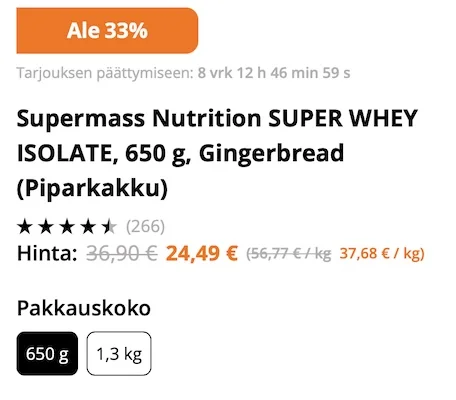- Liittynyt
- 26.6.2005
- Viestejä
- 40
- Ikä
- 40
Olen huomannut että aika monet täällä käyttävät glutamiinia. Kannataisi ehkä säästää rahat, koska sillä ei ole vaikutusta lihaskasvuun ja on täysin tehotonta:
"In fact, intracellular glutamine concentration may not be compromised when plasma levels are decreased postexercise. In addition, a number of recent intervention studies with glutamine feeding demonstrate that, although the plasma concentration of glutamine is kept constant during and after acute, strenuous exercise, glutamine supplementation does not abolish the postexercise decrease in in vitro cellular immunity, including low lymphocyte number, impaired lymphocyte proliferation, impaired natural killer and lymphokine-activated killer cell activity, as well as low production rate and concentration of salivary IgA."
J Appl Physiol. 2002 Sep;93(3):813-22.
"BCAA ingestion does not appear to affect fatigue during prolonged exercise, there is little support from controlled studies to recommend glutamine ingestion for enhanced immune function, and although glutamine stimulates muscle glycogen synthesis, its addition to carbohydrate supplements provides no additional benefit over ingestion of carbohydrate alone."
Int J Sport Nutr Exerc Metab. 2001 Mar;11(1):133-45.
"It is concluded that ingestion of a glutamine/carbohydrate mixture does not increase the rate of glycogen resynthesis in muscle. Glycogen resynthesis rates were higher, although not statistically significant, after ingestion of the drink containing the wheat and whey protein hydrolysate compared to ingestion of the control and free glutamine drinks.."
Int J Sports Med. 2000 Jan;21(1):25-30.
"The purpose of this study was to determine if high-dose glutamine ingestion affected weightlifting performance...
These data indicate that the short-term ingestion of glutamine does not enhance weightlifting performance in resistance-trained men."
J Strength Cond Res. 2002 Feb;16(1):157-60.
"We conclude that glutamine supplementation during resistance training has no significant effect on muscle performance, body composition or muscle protein degradation in young healthy adults."
Eur J Appl Physiol. 2001 Dec;86(2):142-9.
"In conclusion, our results show that decreased plasma and muscle glutamine levels have no effect on whole-body protein turnover or muscle protein kinetics. Therefore, it is unlikely that, in vivo, the intracellular muscle concentration of glutamine is a major regulating factor in muscle protein kinetics."
Clin Sci (Lond). 1999 Jun;96(6):639-46.
"We conclude that intravenous infusion of amino acids increases the fractional rate of mixed muscle protein synthesis, but addition of glutamine to the amino acid mixture does not further stimulate muscle protein synthesis rate in healthy young men and women."
Metabolism. 2000 Dec;49(12):1555-60.
"The purpose was to determine if glutamine supplementation would prevent a loss of lean mass in athletes during a 12-day weight reduction program. It was hypothesized that supplementation would spare lean body mass. Subjects (n=18) exercised and dieted to create a 4186kJ· day-1 energy deficit and a 8372 kJ· day-1 energy deficit on days 1-5, days 6-12, respectively. The glutamine (GLN) group (n=9) ingested 0.35 g· kg-1 body mass of glutamine while a placebo was administered to the remaining subjects. Body mass (BM), lean body mass (LBM) and fat mass (FM), were measured at days 0, 6, and 12. GLN and placebo groups both lost significant amounts of BM, LBM and FM. There were no significant differences between groups. The findings indicate little benefit for retention of lean mass with supplementation of glutamine during a short-term weight reduction program."
Journal of Sports Science and Medicine (2003) 2, 163-168
"In fact, intracellular glutamine concentration may not be compromised when plasma levels are decreased postexercise. In addition, a number of recent intervention studies with glutamine feeding demonstrate that, although the plasma concentration of glutamine is kept constant during and after acute, strenuous exercise, glutamine supplementation does not abolish the postexercise decrease in in vitro cellular immunity, including low lymphocyte number, impaired lymphocyte proliferation, impaired natural killer and lymphokine-activated killer cell activity, as well as low production rate and concentration of salivary IgA."
J Appl Physiol. 2002 Sep;93(3):813-22.
"BCAA ingestion does not appear to affect fatigue during prolonged exercise, there is little support from controlled studies to recommend glutamine ingestion for enhanced immune function, and although glutamine stimulates muscle glycogen synthesis, its addition to carbohydrate supplements provides no additional benefit over ingestion of carbohydrate alone."
Int J Sport Nutr Exerc Metab. 2001 Mar;11(1):133-45.
"It is concluded that ingestion of a glutamine/carbohydrate mixture does not increase the rate of glycogen resynthesis in muscle. Glycogen resynthesis rates were higher, although not statistically significant, after ingestion of the drink containing the wheat and whey protein hydrolysate compared to ingestion of the control and free glutamine drinks.."
Int J Sports Med. 2000 Jan;21(1):25-30.
"The purpose of this study was to determine if high-dose glutamine ingestion affected weightlifting performance...
These data indicate that the short-term ingestion of glutamine does not enhance weightlifting performance in resistance-trained men."
J Strength Cond Res. 2002 Feb;16(1):157-60.
"We conclude that glutamine supplementation during resistance training has no significant effect on muscle performance, body composition or muscle protein degradation in young healthy adults."
Eur J Appl Physiol. 2001 Dec;86(2):142-9.
"In conclusion, our results show that decreased plasma and muscle glutamine levels have no effect on whole-body protein turnover or muscle protein kinetics. Therefore, it is unlikely that, in vivo, the intracellular muscle concentration of glutamine is a major regulating factor in muscle protein kinetics."
Clin Sci (Lond). 1999 Jun;96(6):639-46.
"We conclude that intravenous infusion of amino acids increases the fractional rate of mixed muscle protein synthesis, but addition of glutamine to the amino acid mixture does not further stimulate muscle protein synthesis rate in healthy young men and women."
Metabolism. 2000 Dec;49(12):1555-60.
"The purpose was to determine if glutamine supplementation would prevent a loss of lean mass in athletes during a 12-day weight reduction program. It was hypothesized that supplementation would spare lean body mass. Subjects (n=18) exercised and dieted to create a 4186kJ· day-1 energy deficit and a 8372 kJ· day-1 energy deficit on days 1-5, days 6-12, respectively. The glutamine (GLN) group (n=9) ingested 0.35 g· kg-1 body mass of glutamine while a placebo was administered to the remaining subjects. Body mass (BM), lean body mass (LBM) and fat mass (FM), were measured at days 0, 6, and 12. GLN and placebo groups both lost significant amounts of BM, LBM and FM. There were no significant differences between groups. The findings indicate little benefit for retention of lean mass with supplementation of glutamine during a short-term weight reduction program."
Journal of Sports Science and Medicine (2003) 2, 163-168






